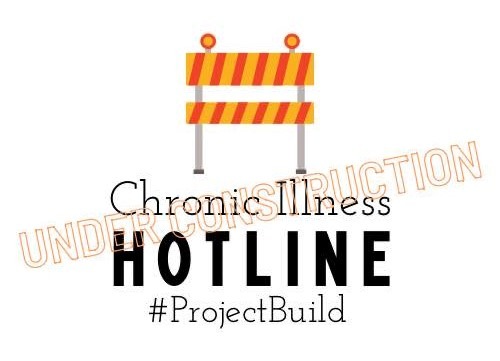When someone you care about is living with chronic illness, injury, pain, disability, or neurodivergence, it can be hard to know how to help. You might feel helpless, uncertain, or even overwhelmed. But your support, whether as a family member, friend, or ally – can make all the difference.
At Chronic Illness Hotline, we believe that no one should face health struggles alone. As we work to launch our new support line later this year, we invite you to join us in building a community where compassion, understanding, and practical help are always within reach.
Here’s how you can be a lifeline for someone you love:
- Listen and Learn
Sometimes the most powerful thing you can do is simply listen. Let your loved one share their feelings and experiences without judgment. Take time to learn about their condition, and ask how you can help. Your willingness to understand shows that you care deeply. - Communicate Openly
Honesty builds trust. Talk openly about challenges and changes, and encourage your loved one to express what they need. Include children in age-appropriate ways, so the whole family feels informed and supported. - Offer Practical Help
Chronic health conditions can make everyday tasks exhausting. Offer specific help: like preparing a meal, running errands, or organizing appointments. Don’t wait for your loved one to ask; sometimes, just knowing someone is willing makes a world of difference. - Respect Their Autonomy
Support doesn’t mean taking over. Empower your loved one to make their own choices about their care and daily life. Ask how you can assist, and respect their decisions, even when it’s hard. - Be There, Consistently
Chronic health conditions don’t take a day off, and neither does the need for support. Check in regularly, celebrate small victories, and remind your loved one they are not alone. Your steady presence is a source of strength.
Specific Things You Can Say to Support a Loved One with Chronic Illness
Finding the right words can be challenging, but genuine, thoughtful phrases can provide real comfort and show your loved one that you truly care. Here are some examples of what you can say to offer meaningful support:
- “I believe you.”
Validating their experience is powerful and helps counter the doubt many people with health conditions face. - “I’m here for you.”
Simple, direct, and reassuring. It lets them know they’re not alone. - “How can I support you best?”
This gives them the chance to express their needs and preferences, showing respect for their autonomy. - “That sounds so hard. I can only imagine how you must feel.”
Expressing empathy goes a long way in making someone feel seen and understood. - “I wanted to bring you a meal. Is there a good time to drop it off, or is there something specific you’d like?”
Offering specific help shows initiative and sensitivity, especially if they have dietary needs. - “I Googled your illness because I want to understand what you’re going through.”
Taking the time to learn about their condition demonstrates genuine care and effort. - “We’ll get through this together. I’m always here for you, day or night.”
Reminding them of your ongoing support can be comforting during tough times. - “You’re doing amazing, and I’m so proud of you.”
Acknowledging their strength and resilience can be incredibly uplifting. - “I have no idea what you are going through, but I want to be here for you in any way I can.”
Admitting you don’t have all the answers, but still offering support, is honest and compassionate. - “Would you like to talk, or would you prefer some quiet company today?”
Giving them options respects their boundaries and current needs.
Remember, the most important thing is to listen, be present, and let your loved one guide you in how best to support them. Your words, when spoken with sincerity, can be a lifeline.
Why Your Support Matters
Family and friends are uniquely positioned to help loved ones thrive. You know their history, their hopes, and their needs better than anyone else. By offering emotional, practical, and social support, you help create an environment where healing and resilience can flourish.
Help Us Launch the Chronic Illness Hotline
Imagine a world where everyone facing health challenges has someone to turn to – a voice on the other end of the line, ready to listen and help. That’s the vision behind the Chronic Illness Hotline. But to make it a reality, we need your support.
Your donation will help us train compassionate volunteers, build accessible resources, and launch later this year. Together, we can create a lifeline for those who need it most.
Join us. Share this post. Donate if you can. Help us build a circle of strength because no one should face chronic health conditions alone.
If you believe in a kinder, more connected world for people with chronic illness, injury, pain, disability, or neurodivergence, please share this post and consider supporting our mission today.
Follow us on LinkedIn, Threads, Instagram, & Facebook. Every donation, follow, and share brings us one step closer to launching the Chronic Illness Hotline. This blog is part of our ongoing series in support of our fundraising efforts. While generous funding is flowing to other nonprofits, we are still searching for donors and partners who truly resonate with our mission. Donate to Project Build today at chronicillnesshotline.org with a one time donation or join our Monthly Donors Circle (starting at $5/mo or $1 for our community members/those with financial hardships but big hearts. Learn more.)
Donate at chronicillnesshotline.org
Project Build is a wholly owned Project of AnchoRRa, a registered public charity, which provides nonprofit status. Your donation is tax-deductible to the extent provided by law. More info & to donate: chronicillnesshotline.org

